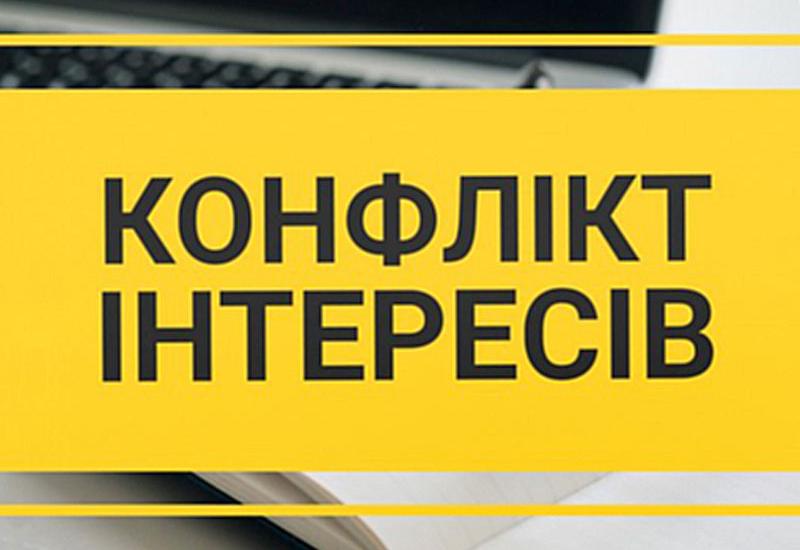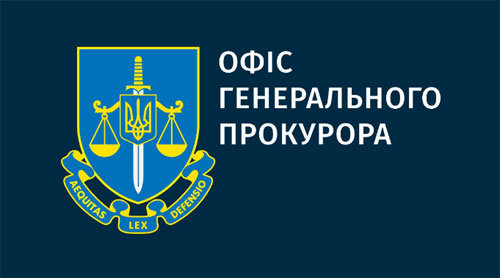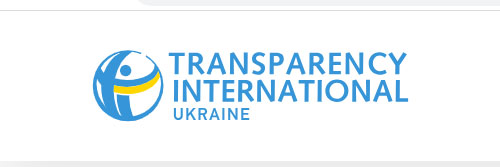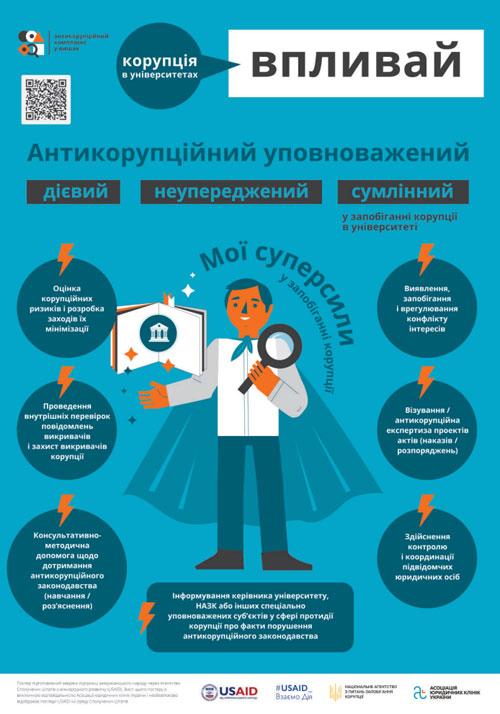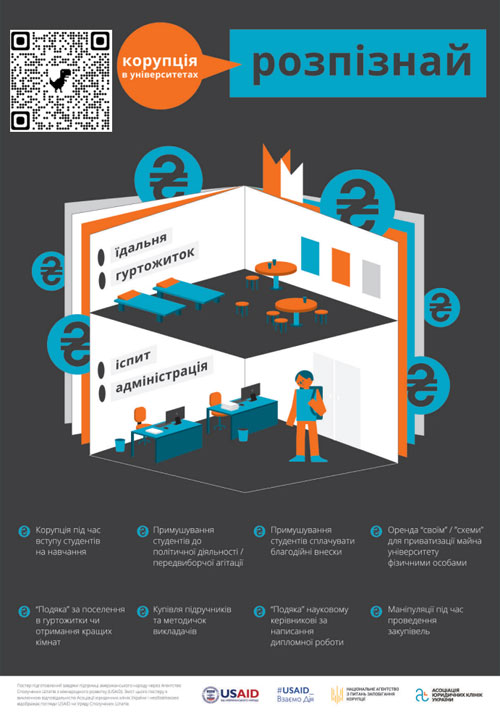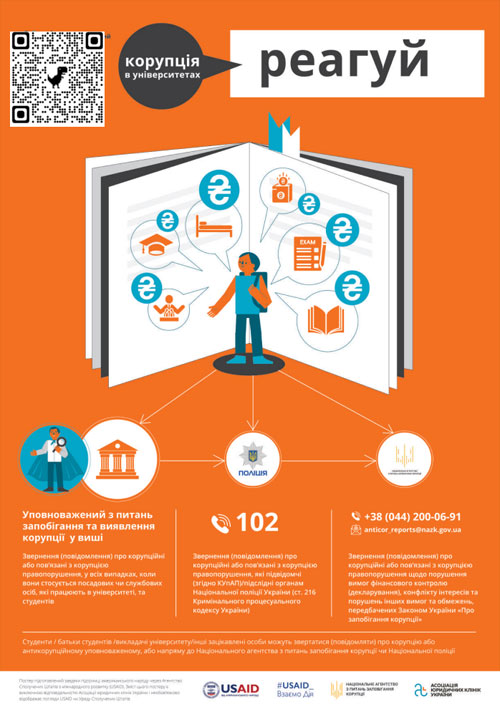A representative of the Igor Sikorsky Kyiv Polytechnic Institute addressed the authorized person for the prevention and detection of corruption in writing with a request to explain what a conflict of interest is, how it manifests itself and how it can be avoided. The issue is important and, indeed, may not be entirely clear to people who are far from the field of law. Therefore, below is a detailed interpretation of this term, an example of a conflict of interest and legal options for resolving this problem.
The Law of Ukraine "On Prevention of Corruption" (the "Law") sets out restrictions on the joint work of close persons.
But the question arises as to who can be considered such persons? The Law provides a clear answer: close persons are family members of the subject referred to in part 1 of Art. 3 of the Law, as well as husband, wife, father, mother, stepfather, stepmother, son, daughter, stepson, stepdaughter, brother and cousin, brother and cousin, wife's (husband's) brother and sister, nephew, niece, uncle, aunt, grandfather, grandmother, great-grandfather great-grandmother, grandson, granddaughter, great-grandson, great-granddaughter, son-in-law, daughter-in-law, father-in-law, mother-in-law, father and mother of the wife (husband) of the son (daughter), adoptive parent, adoptee, guardian or trustee, person under the care or custody of the said entity.
What are the reasons for restricting the joint work of close relatives? First of all, it is due to the emergence of a conflict of interest. The law distinguishes between a potential conflict of interest (when a person has a private interest in the area in which he or she exercises his or her official or representative powers, which may affect the objectivity or impartiality of his or her decision-making or the commission or omission of actions in the exercise of these powers) and a real conflict of interest (a conflict between a person's private interest and his or her official or representative powers, which affects the objectivity or impartiality of decision-making or the commission or omission of actions in the exercise of these powers).
In its analytical materials, the National Agency for the Prevention of Corruption (hereinafter - NAPC) also warns against conflicts of interest between persons who are in friendly or cohabiting relations and work under conditions of subordination. The NACP's warning is based on the norms of ethical behavior of employees of legal entities in the public sphere.
But let's get back to the essence of the conflict of interest.
Some may argue: "...no, I have no conflict, I do everything on a general basis, I do not abuse my powers..." This is good, and we know about the high level of integrity at the university, but the law is the same for everyone and its requirements are unambiguous for everyone. In such circumstances, in the event of a situation in which an applicant for a position is a close person of an employee in direct subordination, a conflict of interest arises that requires an immediate response.
To explain: direct subordination is a relationship of direct organizational or legal dependence of a subordinate on his/her supervisor, including through the decision (participation in the decision) of hiring, dismissal, application of incentives, disciplinary sanctions, provision of instructions, orders, etc., and control over their implementation.
Therefore, the duty of each university employee in accordance with the Law is to:
1) taking measures to prevent the emergence of a real or potential conflict of interest;
2) notify his/her immediate supervisor no later than the next business day from the moment when the person learned or should have learned about the existence of a real or potential conflict of interest
3) not taking actions and not making decisions in the context of a real conflict of interest;
4) taking measures to resolve a real or potential conflict of interest.
This leads to the following question: how can the issue of conflict of interest be resolved?
The legislator provides several options for solving this problem:
1) removal of a person from performing a task, taking actions, making a decision or participating in its adoption in conditions of a real or potential conflict of interest;
2) application of external control over the person's performance of the relevant task, performance of certain actions or decision-making;
3) restriction of a person's access to certain information;
4) reviewing the scope of the person's official powers;
5) transfer of a person to another position;
6) dismissal of the person.
Each of these options for resolving conflicts of interest is applied taking into account certain circumstances, such as the duration and interaction, the degree of corruption risk, etc.
The NAPC emphasizes that there should be no hidden conflicts of interest in the activities of legal entities of public law, which include Igor Sikorsky Kyiv Polytechnic Institute.
The Rector of Igor Sikorsky Kyiv Polytechnic Institute insists on working to eliminate any corruption risks in the university's activities. For this purpose, the university commission for corruption risk assessment works. It considers issues in various areas of the university's work: organizational, administrative, financial, educational, scientific and personnel.
But let's get back to the joint work of close relatives.
How do you know if you have a conflict of interest or not?
Let's take an example. A person close to you has lost his job, and you, as a sympathetic person interested in ensuring that he does not lose his livelihood, have offered him a vacancy that is currently available in a subordinate unit. You are the head of this unit and perform organizational, managerial or administrative functions, i.e., you have certain authority.
This person, and you are sure of it, is a decent person, a qualified specialist and a responsible employee, and therefore, in your opinion, the best candidate for the position. In addition, during the course of your work, you will find it easy to get along and count on their support, and you will not need to check and remind them several times to complete a particular task - or so you think.
But...
Over time, your loved one may ask you for a promotion, or you may want to transfer them to a higher position or a position with a higher salary, or pay them a bonus that is higher than the rest of the staff, or give them a vacation for a period of time and at a time when everyone else is denied, or not include them in working and advisory bodies and not assign them additional responsibilities, etc. - there may be many such "ors".
You won't pay attention to her lateness, you won't ask her to stay overtime because you know she has, say, flowers for the theater; or you will ask for a raise because her child goes to school, or something like that.
This is where the conflict of interest comes in.
On the one hand, you take care of a loved one by making concessions to them, and on the other hand, it slows down the workflow or puts additional workload on other employees. At the same time, a person close to the manager receives money on time, and often in an increased amount.
Leaving aside the popular wisdom that one should not work with close relatives, let us only note that the legislator also disapproves of the joint work of close relatives, seeing it as a potential danger of abuse or nepotism.
The Law of Ukraine "On Prevention of Corruption" stipulates that a real or potential conflict of interest is a corrupt practice and carries corruption risks. Therefore, in order to prevent this in the activities of university employees, situations of conflict of interest should be avoided in every possible way.

